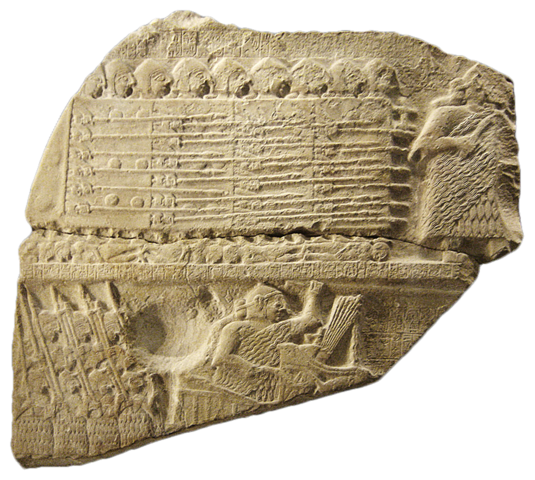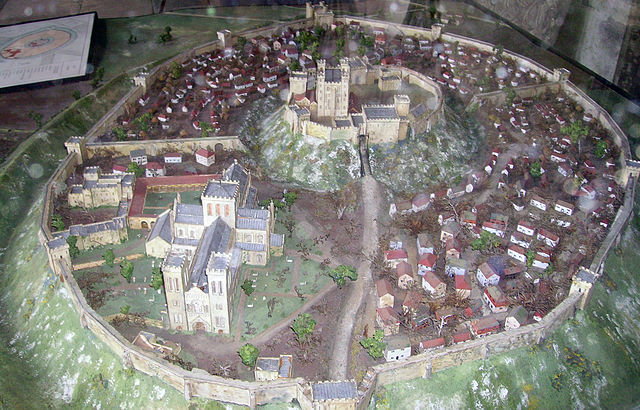Ancient and modern: making 4,000-year-old music with a 21st-century twist

Asked if she fancied making ‘extreme early music’, Stef Conner couldn’t resist. Little did she realise how extreme. She explains how she has breathed life into a 4,000-year-old language
Read more here.
How India changed the English language
For hundreds of years, words have flowed along the routes of trade and empire. Rahul Verma follows some of their remarkable journeys.
Read more here.
Lectures and haircut

Table Hill
Here’s an update about what I’ve been doing lately. First of all, what I haven’t been doing lately is writing, I’m afraid. 🙁 I’m stuck in the middle of my latest children’s book and so far I haven’t been able to get unstuck. I’m looking forward to getting some help from my sister but at the moment she’s too busy with work and her studies to be of any help.
So what I have been up to lately is mainly going to lectures. Usually, I try to go with either my mother or my sister, but so far, they haven’t had time or felt up to it so I’ve been going alone.
The first one was about this town and surrounding area during a time or rather times of unrest (ie war), back in the 17th, 18th and early 19th century. It was interesting, except for the fact that the lecturer (the head of the museum) kept referring to sources for genealogists. which my family and I are, but at the times the lecture referred to no one in our family lived around here, so I always feel a little bored when that comes up. Anyway, I’d already heard a little about this in an earlier lecture by the same man.
At the end of the lecture I went up to ask the man about something I’d heard of before. Some of you may remember that my sister and went on a guided tour of the cellars underneath the ‘Residence’ of the ‘governor’ (not sure of the exact translation of the Swedish term). Anyway, that’s about the oldest parts left of this town. Except for the rumoured baking ovens beneath the old prison, now converted into an exclusive apartment building. As it turned out, there are no ancient ovens left, but apparently there are some vaults or a vault anyway, where the ovens used to be. The man quite decently offered to show it or them to me, since he lives in the building. Unfortunately, I lost his card, but my sister works in the same building and knows him, even though her archive doesn’t have anything directly to do with the museum’s archives so she can get in touch with him. I hope we can both go and take a quick look at the vault. It may not sound very exciting, and the man himself didn’t seem to think so but again, we’re talking about some of the oldest parts of this town, so I’d still like to have a look. I’ll post about it later if I do get to go.
The second lecture was about the Swedish language and it was quite interesting, despite the fact that the woman who held it, a professor of Swedish at the University of Gothenburg, and the Dean (I think that’s the word) of the local college, was really proud of herself and her ancestry and never let a moment go by without pointing out what an illustrious ancestry she had or how brilliant she is to have been appointed to many prestigious councils and other exclusive academic groups. Apparently she didn’t like my questions so she tried to silence me by being condescending, while flattering an older man in the audience (entirely made up of retired people, except for a guy who seemed to be there as the driver of his grandfather or someone) for his questions that chimed in well with her narrative. Oh, well, like I said, it was interesting, but I didn’t like that woman.
Finally, I went to listen to someone give a talk about the ancient mythology of the Table ‘mountains’/hills around here. Some people are of the opinion that all our ancient mythology can be traced to them, or rather one of them in particular, one that is right nearby (see image above). The whole thing was entertaining, and since the subject refers to ancient times (more or less – in the Mediterranean, they’d refer to this time period as ‘Late Ancient Times or Early Mediaeval) anything might be true. However, this recently retired man, not sure about his actual qualifications, who used to be the head of another museum nearby, was so completely convinced of his own ideas, it was a little scary. He made little half-hearted jokes about how he ‘might’ be wrong about a few little things in his research, but his facial expression and tone hinted that he didn’t think so, at all. Despite that, it was all quite fun to listen to and made sense up to a point. Our Nordic mythology might have originated here, it’s a guess as good as any and like I said, some of his arguments made a bit of sense.
Other than these lectures, all I’ve done is have a much needed haircut. I might post a photo later on. Anyway, any readers I might have, will surely have tired of my ramblings long ago. 🙂
Some Major Works in the History of Linguistics
Find out more here.
Old Sarum archaeologists reveal plan of medieval city
A detailed plan of a medieval city has been produced by experts without any digging at the site.
The latest scanning techniques were used to uncover a network of buildings at the 11th Century Old Sarum near Salisbury in Wiltshire.
The results include a series of large structures, possibly defences, with open areas of ground behind possibly for mustering resources or people.
Old Sarum was the original site of Salisbury, which is two miles away.
Read more here.
Five centuries in this town

Old town

New town
On Thursday evening, I went to a lecture about this town’s history during five hundred years. As most of my followers know, I hate this town, so in a way, it’s odd that I wanted to go and listen to that. On the other hand, I also love history.
The guy who did the lecture works at the museum and he’s got a bit of a reputation (oddly enough, since he’s such an unimpressive character when you look at him – or listen to him), but it’s not about his personal life, I was going to tell you. Anyway, he performed well enough, as a lecturer.
The first ‘century’ (not quite a century) – the sixteenth – was actually before the town proper was founded, in fact before the earlier town too. From the early sixteenth century, there was a market place at the south end of the big lake.
At the end of one of our wars with our big neighbour in the east, the king wanted to place prisoners of war (officers, not ordinary foot soldiers) in the care of the people responsible for the market place. They, on the other hand did not want to play host to a bunch of foreign officers. They claimed that they were too poor, and that there were only a few old, infirm people living there, and finally, that only towns were required to house prisoners of war. Apparently the king really wanted to place the prisoners there, because his response was giving the market place town privileges.
This was built some distance to the south of the original market place, where there is still a church ruin and an old cemetery. To modern eyes, the town would look very small and cramped, with a number of houses laid out unevenly around a small cobbled square.
The town was in existence for just over a generation but there are some very interesting stories about it. The lecturer did not go into them during this lecture, but I happen to know that he’s written a book about them. I won’t go into the stories in this blog post either, since it’s about this particular lecture.
Then the harbour began to silting up and it was no longer possible to conduct the town’s main business – transport, and the town had to be moved. It was also built on a rocky slope which made it hard to expand. Despite that, the townspeople were reluctant to leave and (again, not included in the lecture) the authorities had to use underhanded methods to get them to move out. The final straw was that the Danes invaded and razed the town.
So after all kinds of trouble and tribulations, a town was built on a peninsula that would be more easily defensible. Originally, it was meant to be built as a fort (hence the name ending in -borg, which means fort/castle), but in the end, the fortifications weren’t all that impressive.
I’m not going to go into all the twists and turns of the town’s history. At times I found my mind wandering. In any case, the Danes returned a couple of times and burned the town again. When the defenders had to burn the few buildings they’d already got in place, to avoid having the enemy barricading themselves there, the wide streets made it easy to put out the fire. Despite that, the town was burned down a couple of times, notably close to its two hundredth anniversary in 1834.

Songwriter
What really caught my interest was the mention of one of our most famous 20th century poets (early 20th century). It amazed me how much he and I had in common.
His parents had a shop in town (so did my grandparents, not my parents). They felt ostracised by the townspeople. He (Birger), had trouble with his education (high school), just like I had trouble with mine (university). It was hard for him to focus, so instead he spent his time during lessons, looking out the window, memorizing what he’d seen then telling people about it, eventually writing it down. I, too, had trouble focusing and started to drift off into a fantasy when I felt unable to keep up (though it was mainly the exams and the papers that I had trouble with, not the lectures).
In the end, he left without sitting the exams, and started writing (in his case poetry). Even though he’d failed his music classes, someone was allowed to set music to his poetry so he became, rather against his will, a songwriter, and was forced to go on tour, though he felt too shy for that. Eventually, he ended up reading his poetry on stage, to the people of his own childhood home town, but despite all his self doubt, instead of being a failure, he was actually hailed as a great success, so I guess a few people really do end up popular, even in their own home towns.
Interesting lecture
Today I went to listen to a very interesting lecture about the Norwegian Resistance during WWII, or rather the interactions between the Resistance and Swedish people living close to the Norwegian border.
It was a bit surprising to me that the rather rural, and in my eyes primitive nearby region, the ‘backwoods’, had such a heroic and adventurous past.
The woman who did the lecture had written a book about the interaction with the Resistance, and was apparently behind an exhibition that was the starting point of her book and the lecture we heard today.
Something I had no idea about until today, was that during the war the region (where our little cottage is) was forbidden to any outsider, because of fears of espionage.
One funny story was about a little Finnish ‘war child’ who had been a little too observant in the farm where she lived. She’d found an amazing piece of silk fabric (a parachute) hidden in the barn and had to be kept quiet. So a man, working with the Resistance, who was known to be very eloquent and also kind to children, traveled all the way out into the woods and gave her a big, expensive doll, on the condition that she kept quiet. There was a photo of the girl holding two dolls, one of which was probably the ‘bribe’.
A rather less funny story, was about a Swedish man who for the rest of his life was the target of threats from old Nazis.
Some members of the audience had stories of their own to tell. One of them was really touching and sad. The sister of a man in the Resistance was a journalist. She wasn’t careful enough about her activities and was caught by the Germans and sent to a concentration camp. At the end of the war, she was taken by the famous Swedish White Buses (sent by a Swedish count) to the south of Sweden, but the first night there, she died. Despite what you might think, apparently mother was ‘happy’ that her daughter had died in Sweden (i e not in a gas chamber).
I’m glad I forced myself up at rather an early hour, despite my cold (which isn’t too bad, but still) to go and listen to this lecture. It was fascinating and I learned so much about a time in our history that isn’t very well known to the general public. (For instance, much of this has been classified until recently).
Somewhere in Sweden (‘My soldier’)
This one doesn’t have anything to do with my situation, but since I was on YouTube and found this sad song, I’ll post it here anyway. And just because I’m interested in history.
A Short history of the Pencil | Freedom for Cetaceans
Read more here.
Crossrail unearths evidence humans lived on Thames in 7,000 BC
Read more here.



